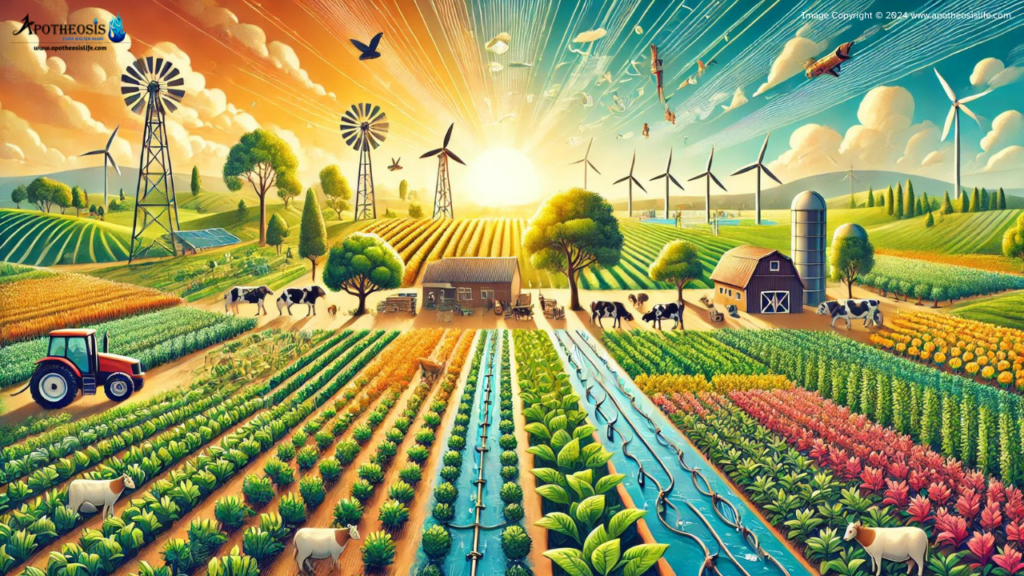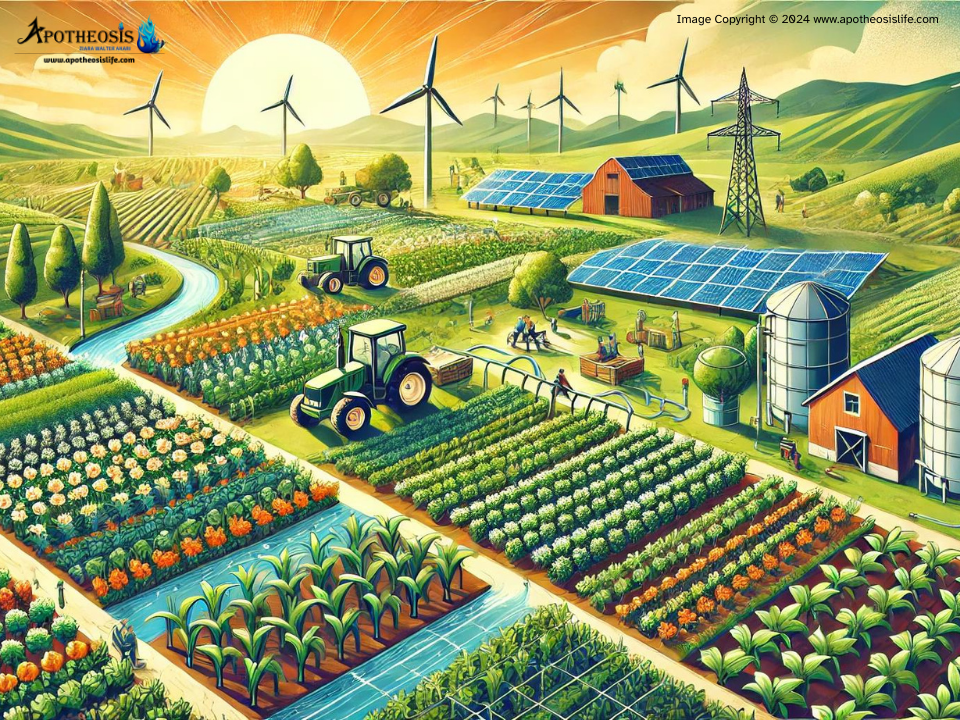Sustainable agriculture is a farming approach that aims to produce food in a way that is environmentally friendly, economically viable, and socially responsible. It prioritizes the health of the environment, the well-being of farmers and communities, and the long-term viability of agricultural production. As global food security becomes an increasingly pressing issue, sustainable agriculture offers a solution that can help meet the growing demand for food while preserving the planet’s resources.
What is Sustainable Agriculture?
Definition
Sustainable agriculture involves farming practices that are designed to maintain the health of the soil, reduce pollution, conserve water, and promote biodiversity. It also emphasizes the importance of fair labor practices and the well-being of farming communities.
Key Principles
Soil Health: Sustainable agriculture focuses on maintaining and improving soil fertility through crop rotation, cover cropping, and reduced use of chemical fertilizers.
Water Conservation: Efficient water use and management practices are essential to sustainable agriculture, reducing the strain on water resources and ensuring their availability for future generations.
Biodiversity: Promoting biodiversity on farms, including the use of diverse crops and livestock, helps build resilient ecosystems that can withstand environmental changes and pests.
Reduced Chemical Use: Sustainable agriculture seeks to minimize the use of synthetic pesticides and fertilizers, opting instead for natural alternatives and integrated pest management.

Image Copyright © 2024 www.apotheosislife.com
Benefits of Sustainable Agriculture for Food Security
Increased Resilience to Climate Change
Sustainable agricultural practices help build resilience to climate change by improving soil health, conserving water, and enhancing biodiversity. These practices make farms better equipped to withstand extreme weather events, such as droughts and floods, which can otherwise devastate food production.
Improved Soil Health and Productivity
Healthy soils are the foundation of productive agriculture. By using practices like crop rotation, cover cropping, and organic amendments, sustainable agriculture enhances soil fertility and structure. This leads to higher crop yields and long-term productivity, which are essential for meeting the food demands of a growing global population.
Reduced Environmental Impact
Sustainable agriculture reduces the environmental impact of farming by minimizing the use of harmful chemicals, conserving water, and protecting natural ecosystems. This not only preserves the environment for future generations but also ensures that agricultural lands remain productive and capable of supporting food production.
Supporting Local Economies
Sustainable agriculture often emphasizes the importance of local food systems and fair labor practices. By supporting local farmers and communities, sustainable agriculture contributes to economic stability and food security at the regional level. Local food systems also reduce the carbon footprint associated with transporting food over long distances.
Biodiversity and Pest Management
Diverse farming systems are more resilient to pests and diseases. By promoting biodiversity, sustainable agriculture reduces the need for chemical pesticides and helps maintain a balance of natural predators and pests. This not only protects crops but also preserves the health of surrounding ecosystems.
Efficient Resource Use
Sustainable agriculture practices, such as precision farming and agroforestry, optimize the use of resources like water, energy, and nutrients. This efficiency reduces waste and ensures that resources are used in a way that can be sustained over the long term.
Challenges and Opportunities
Challenges
Transition Costs: Farmers may face initial costs when transitioning to sustainable practices, including the need for new equipment, training, and changes in production methods.
Market Access: Access to markets that value sustainably produced food can be limited, particularly for small-scale farmers.
Policy Support: Strong policy frameworks and incentives are needed to support the adoption of sustainable agricultural practices on a larger scale.
Opportunities
Innovation: Technological advancements and innovative farming practices can help overcome challenges and enhance the sustainability of agriculture.
Consumer Demand: Growing consumer awareness and demand for sustainably produced food can drive the adoption of sustainable practices in agriculture.
Global Collaboration: International cooperation and knowledge-sharing can accelerate the transition to sustainable agriculture, ensuring food security for all.
Sustainable agriculture is not just a farming method; it is a pathway to ensuring long-term food security while protecting the planet’s resources. By embracing sustainable practices, we can build a more resilient, productive, and equitable food system that meets the needs of present and future generations. As the world faces the dual challenges of feeding a growing population and addressing environmental degradation, sustainable agriculture offers a promising solution that benefits both people and the planet.
Details of the Featured Image
A vibrant image of a sustainable farm featuring diverse crops, healthy soil, efficient irrigation systems, and solar panels in the background. The image emphasizes the harmony between agriculture and nature, highlighting the benefits of sustainable farming practices.
Image Copyright © 2024 www.apotheosislife.com
Author
Ziara Walter Akari
© www.apotheosislife.com
